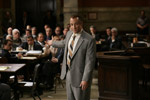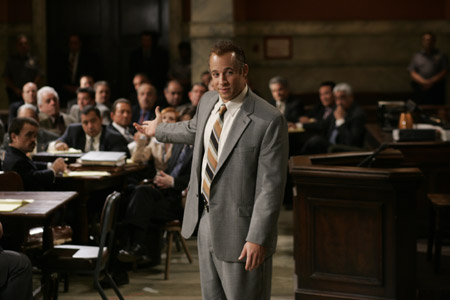Find Me Guilty
 The opening titles inform us that the court dialogues in “Find Me Guilty” are from actual testimony in the racketeering trial of twenty associates and members of the Lucchesi crime syndicate, led by Nick Calabrese (Alex Rocco). Giacomo “Fat Jack” DiNorscio (Vin Diesel) is, by relative standards, a pawn in the equation. After his cousin, Tony Compagna (Raúl Esparza), attempts to kill him in his…
The opening titles inform us that the court dialogues in “Find Me Guilty” are from actual testimony in the racketeering trial of twenty associates and members of the Lucchesi crime syndicate, led by Nick Calabrese (Alex Rocco). Giacomo “Fat Jack” DiNorscio (Vin Diesel) is, by relative standards, a pawn in the equation. After his cousin, Tony Compagna (Raúl Esparza), attempts to kill him in his…

©2006, Yari Film Group Releasing.
The opening titles inform us that the court dialogues in “Find Me Guilty” are from actual testimony in the racketeering trial of twenty associates and members of the Lucchesi crime syndicate, led by Nick Calabrese (Alex Rocco). Giacomo “Fat Jack” DiNorscio (Vin Diesel) is, by relative standards, a pawn in the equation. After his cousin, Tony Compagna (Raúl Esparza), attempts to kill him in his own bed, Jackie DiNorsico is arrested on drug possession and trafficking; he falls asleep at his trial, only to wake up in time to discover his attorney has argued his way into a maximum sentence of thirty years.
If it weren’t for Compagna’s lousy aim, Jackie would be dead. So he shoots him several more times. Even so, Jackie only ends up getting bandages and bed rest at the hospital. Then the authorities arrive to take statements from Jackie and his daughter so they can charge Compagna. The family refuses, stating they didn’t see anything. The investigators leave, advising Jackie not to complain if someone comes in and pops him in his sleep. He wryly retorts, “If someone pops me I won’t come complainin’ to nobody.”
While in a holding cell, he’s taken downtown to the office of US Attorney Sean Kierney (Linus Roache), who is prosecuting the case against the Lucchesi crime family. Jackie’s wined and dined in the attorney’s office in order to entice him to rat on the whole gang in exchange for a reduced sentence on his trafficking charge. Jackie, ever optimistic about his relations with the others, refuses to fold.
The way it’s portrayed, the RICO case—in which Jackie is the only one out of the twenty charged who elects to defend himself—runs dangerously close to double jeopardy. Jackie approaches his own defense, with help from Calabrese’s attorney Ben Klandis (Peter Dinklage), in the manner of any wiseguy trying to talk his way out of a ticket. That’s part of his charm, but it’s kind of a dull, forced charm—maybe, however, that’s the point. At any rate, here’s where the film runs into myriad clichés that drag it far, far away from the taut courtroom drama that was Lumet’s “12 Angry Men.”
We have the ex-wife who empathizes with Jackie (catalyzed by yet another cliché plot point I won’t spoil), the daughter who looks up to dad even though he is a drug trafficker, the hotheaded wheeling-dealing caricature of a prosecutor who fails to resemble the collected stature of any US Attorney I’ve ever encountered, the dry and easily-offended Judge Feinstein (Ron Silver) with whom the boisterous defendant (DiNorscio) spars far more than would be tolerated in a real court, and the overarching plot of the wise-ass defendant who earns the iron-fisted judge’s respect. But let me stop here for a second… there is also the unassuming and gentle side of Jackie, and an understandably empathetic Feinstein who stops being a judge for a moment when compassion is required of him as a human being.
Jackie, having only a sixth-grade education, doesn’t have the demeanor or the cleverness of a trial lawyer, but like all movie mobsters, he knows a con when he sees one. Giving the film the benefit of the doubt because the testimony that is portrayed is recited verbatim from the court transcripts, it could be that Jackie was just such a street-wise prankster who did juxtapose intuitive lines of questioning with crude attempts at humor—by crude I mean unimaginatively vulgar. The crude humor isn’t played simply for laughs so much as it’s used to establish Jackie’s character; at one point, a bailiff asks, “What’d he say? I didn’t hear the punchline.” In a way, these antics aid in setting him up as the underdog we’re intended to begin rooting for. Sure, that’s entertaining… but isn’t that also pulling the audience’s collective eyeline toward a particular angle of perception?
As Pauline Kael noted about Lumet’s technique, his sense of space is, indeed, best suited for television. As she observed some 40 years ago, even this many decades later he still doesn’t seem to have developed any sense of scene composition outside the immediate foreground. Backgrounds are ignored almost entirely, and thus many layers of storytelling are lost by a director whose vast experience could give us so much more in a film that attempts to be a dark comedy on at least the level of Elmore Leonard if not the Coen Brothers. Angles are flat, rarely oblique, and palettes are desaturated to the point of stale faces almost indiscernible from the background hues of the courtroom against which they’re set, and wide shots are often slightly out of focus. This gives everything the texture of a 1970’s television broadcast, which is annoying on the one hand. However, oddly, it seems rather appropriate for this setting in the same way that Lumet’s sparse, tight shots of the jury seemed appropriate for “12 Angry Men”—the focal length sequentially adjusted throughout to create the astonishing sensation of walls closing in.
The key failure of “Find Me Guilty” is that the drama is as flat as the cinematography. We never get the sense that Diesel’s sincerely behind his character. There are, however, two exceptions: As Jackie’s wife, Annabella Sciorra carries a scene in which she lays into Jackie verbally for his philandering, and still demonstrates lingering feelings for him; Peter Dinklage, as de-facto lead counsel, carries himself in as perfunctory and rational a manner as one would expect from a lawyer who’s not getting paid $500 an hour to lose. Unfortunately, these two performances are stuck inside a film that fails to engage. I’m not expecting editing gimmickry here to make an otherwise dull story interesting, but given that the transcript-lifted dialogue is compelling in and of itself, we could have done just as well to watch the proceedings on Court TV—free, as it were, to flip channels or get up for a snack and skip the parts that disinterest us, rather than be held hostage by 125 minutes of drive-by clichés.
 Find Me Guilty • Dolby® Digital surround sound in select theatres • Running Time: 125 minutes • MPAA Rating: R for strong language and some violence. • Distributed by Yari Film Group Releasing
Find Me Guilty • Dolby® Digital surround sound in select theatres • Running Time: 125 minutes • MPAA Rating: R for strong language and some violence. • Distributed by Yari Film Group Releasing